Frequently Asked Questions
1. Is GitHub or GitLab better?
In case you are working on a bigger task as a team with various developers, then, at that point, GitHub can be the better decision. Having said that, if the project requires continuous integration, GitLab can be inclined upon.
2. Is GitLab more expensive than GitHub?
GitLab’s Premium plan starts at $19 per user/month. It gives managers access to project management and code integrity controls. The GitHub Team plan starts at $4 per user/month. GitLab Ultimate will set you back $99 per user/month versus $21 per user/month for GitHub Enterprise.
4. Can I use GitLab for free?
If you have a knack of using GitLab, we recommend you download and install GitLab Enterprise Edition. The Enterprise Edition is available for free and is packed with all of the features available in the Community Edition, without the need to register or obtain a license.
Pricing
It is hard to compare the pricing between GitLab and GitHub because the paid features are vastly dissimilar. The pricing structure for the two platforms is quite different as well. The main feature that scales for GitLab is CI/CD minutes, while GitHub scales both Actions and Storage space with the user plan. For increased Storage on GitLab, you’d pay separately.
GitLab pricing
Free – 400 CI/CD Minutes
$21/User/Month – 1,000 CI/CD Minutes.
$99/User/Month – 50,000 CI/CD Minutes.
$10 one-time payment – 1000 additional CI/CD Minutes
$60 annual – 10GB Storage. (first 10 GB are free)
GitHub pricing
Free – 500MB and 2000 Actions Minutes.
$4/User/Month – 2GB and 3000 Actions Minutes.
$21/User/Month – 50GB and 50,000 Actions Minutes.
GitHub One is also available, but there is no public pricing and will depend on negotiation with the sales team.
At face value, GitLab is quite significantly more expensive in terms of Storage and CI/CD minutes. GitLab does however advertise priority support starting at the $19 price level, while GitHub only advertises 24/7 support at the GitHub One level, price unknown.
What is Gitlab?
Shortly after Github was created, created Gitlab to solve a collaboration problem specific to his projects. Funny fact, the solution was created as a Github repo.
Core features of Gitlab include:
- Source code management — Gitlab provides working space for any code files your team needs to collaborate on. You can edit, moderate access, and iterate efforts on code by branching and merging with main files.
- Automatic DevOps — Gitlab provides a pipeline that removes quality reviews, testing, security scanning, and deployment out of your engineers’ hands. Where several steps and team members would be handling these, the auto-DevOps feature kicks into action as soon as code is submitted to a repository.
- Gitlab DevSecOps — An approach to security that runs static tests (SAST) on every code block before it commits to main files. The same feature inflicts vulnerability management, android app testing, and container security.
- Infrastructure automation — By merging the core features of Gitlab and GitOps, users enjoy a seamless infrastructure automation experience.
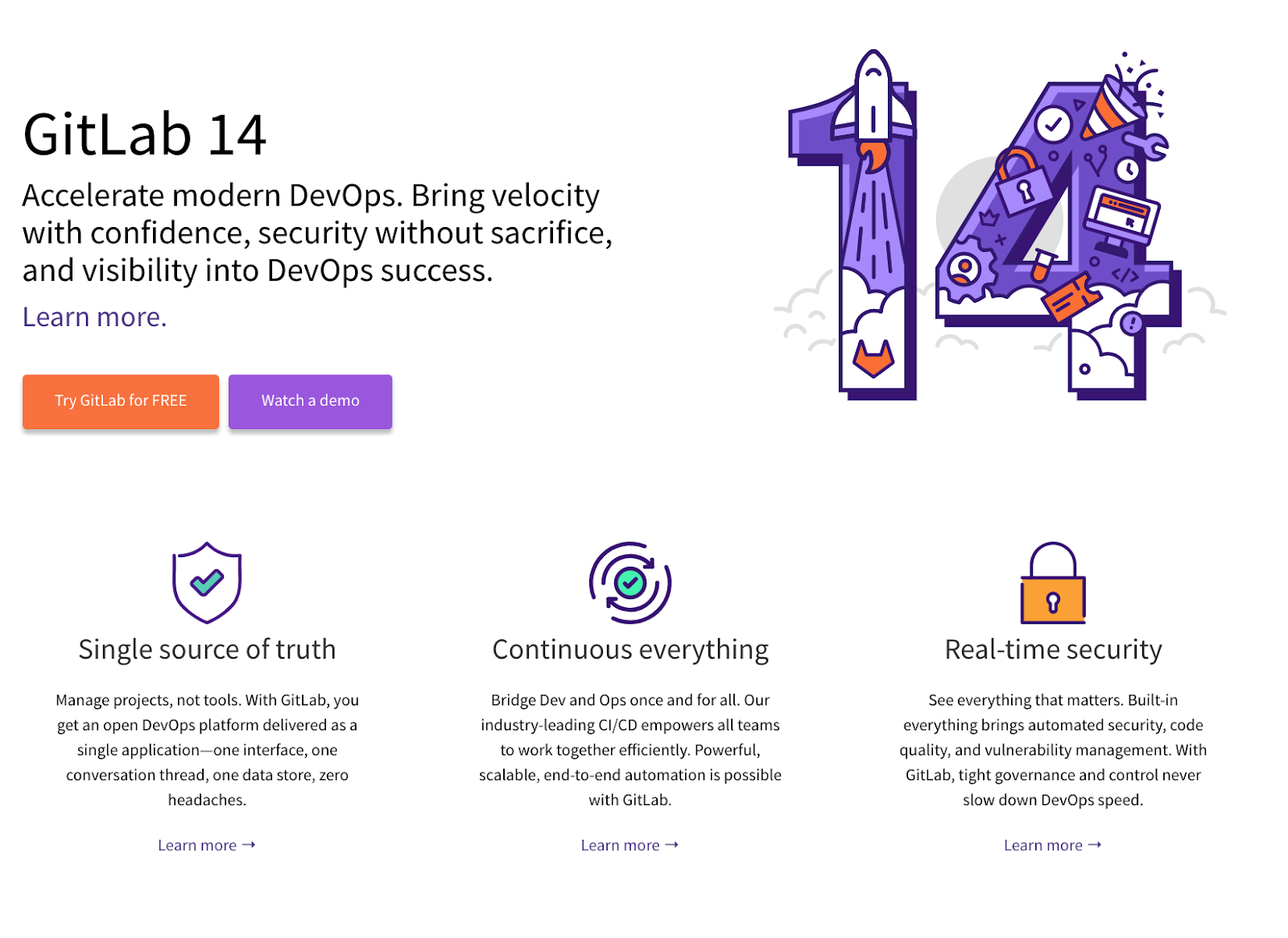 Gitlab welcome screen
Gitlab welcome screen
A unique selling point for Gitlab is how it immediately assumes Agile methods and DevOps pipelines in every project. You can be sure that it fixes a problem that had not been touched by Github—given how it emerged from it.
Now that we know what both Github and Gitlab have to offer, let’s take a closer look at the features that separate one from the other.
¶ Клонирование репозитория
Для получения копии существующего Git-репозитория необходимо ввести в терминале команду .
Клонирование репозитория осуществляется командой:
После вы должны ввести имя пользователя и пароль от своей учетной записи в GitLab.
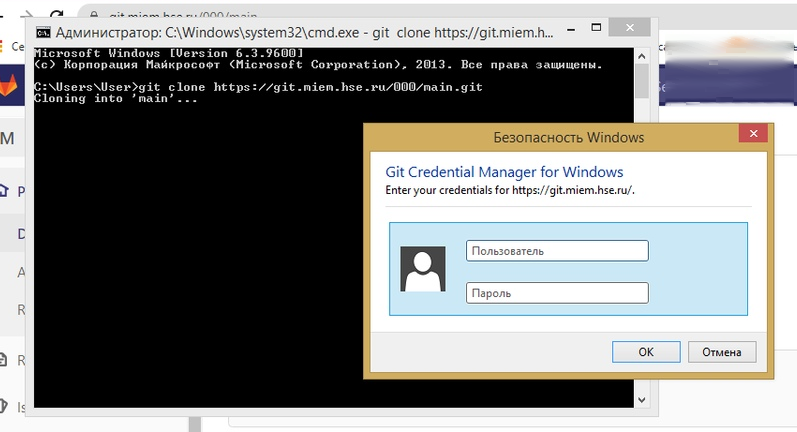
Вы можете в любой момент перейти к папке с вашим репозиторием с помощью команды:
Следующая команда показывает, что файл «README.md» скачался и лежит в нашей папке:
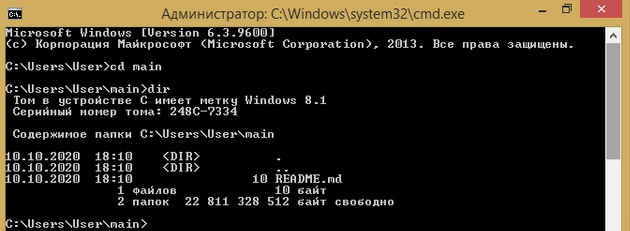
Заполнение данных
Если указана опция , то эти настройки достаточно сделать только один раз, поскольку в этом случае Git будет использовать эти данные для всего, что вы делаете в этой системе. Если для каких-то отдельных проектов вы хотите указать другое имя или электронную почту, можно выполнить эту же команду без параметра в каталоге с нужным проектом.
Если вы хотите проверить используемую конфигурацию, можете использовать команду , чтобы показать все настройки, которые Git найдёт:
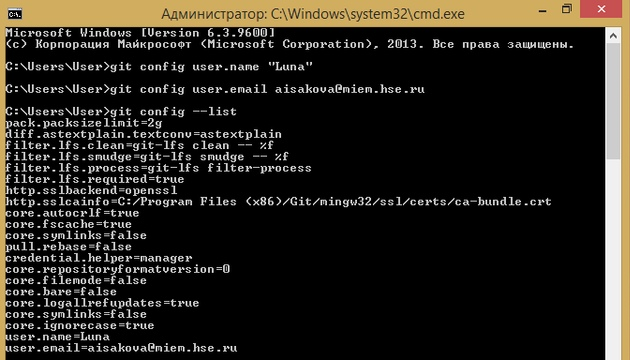
Добавление файлов в репозиторий
Одной из важнейших команд является . Система отслеживает изменения, и с помощью этой команды мы узнаем о состоянии системы. Если выполнить эту команду сразу после клонирования, то можно увидить что-то вроде этого:

Это означает, что у вас чистый рабочий каталог. Другими словами, в нем нет отслеживаемых измененных файлов. Git также не обнаружил неотслеживаемых файлов, в противном случае они бы были перечислены здесь.
Если у вас уже есть некоторые файлы, которые нужно перенести в репозиторий, вы можете скопировать их в рабочий каталог.
The Basics of Git and Cloud-Based Git Repositories
If you’re a complete beginner and new to Git, you should learn some fundamentals before picking the right option. But if you’re an experienced Git user, feel free to skip past this section.
Git is an open source version control system (VCS) that lets you save “snapshots” of a software project. It keeps track of all the changes you make to any program.
What sets it apart from traditional version control is that you can work on different branch versions of the software and manage them all simultaneously.
You can then test them by merging them with a staging branch and the live version when you finalize a better variant.
 Git branches (Source)
Git branches (Source)
Only with Git do you have the freedom to work on various versions at once. It’s a must-have for any team that wants to do feature-based development.
With Git, all of this happens locally on your computer. But you can also request and give access to other developers manually—over a LAN, for example.
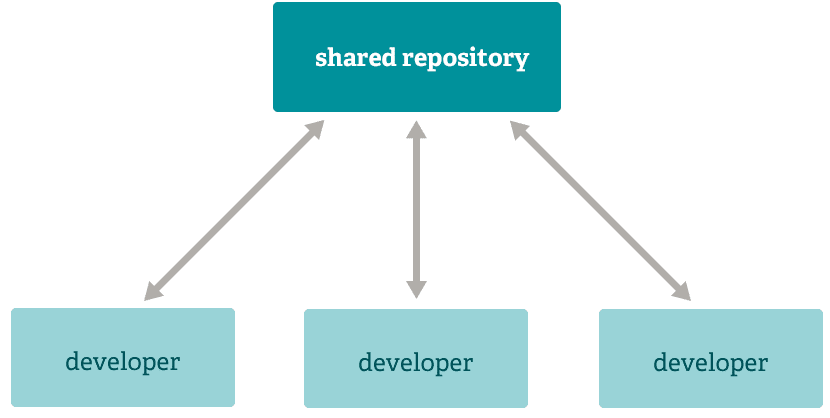 Git shared repository (Source)
Git shared repository (Source)
Most companies turn to cloud-based solutions when working with larger remote or distributed teams. Enter GitLab and GitHub.
They offer unlimited cloud-based storage for repositories. Developers from all over the world can easily collaborate on code. And they can do it without setting up a virtual LAN or manually sharing repositories.
But cloud-based Git repositories like GitHub and GitLab go beyond the basic Git functionality. They also include project management, collaboration, and deployment tools to help improve the development workflow.
Our Git vs GitHub post explains these aspects in more detail. Or you can watch the video below:
Now, let’s see how GitLab and GitHub stack up against each other.
Как понять, нужен ли вам GitHub
Безусловно, GitHub нужен не всем. Допустим, вы ещё только учитесь кодить или неспешно делаете небольшой проект для личного пользования — и вас устраивает хранение проекта на локальной машине. Может, сейчас вы просто учите язык, который вам нравится, и на данном этапе не хотите хвататься за всё сразу.
В первую очередь GitHub необходим проектам с частыми обновлениями, множеством версий, большим количеством файлов, необходимостью синхронизации разработки и удобного развёртывания.
Хотя и тут есть исключения — даже некоторые из ключевых разработчиков ядра Linux до сих пор обмениваются обновлениями кода с помощью электронной почты и архивов с файлами ![]()
И действительно, есть множество других способов хранения исходников: можно создать для них папку в разделе «Мои документы», закидывать их в облако и подписывать версии или даже загружать в «Избранное» в Telegram или «ВКонтакте» (костыльно, да, но вполне реально).
А ещё можно накидывать список изменений в заметках в телефоне/на холодильнике текстом в приватном Telegram-канале. Можно деплоить проект с помощью простого скачивания и распаковки ZIP-архива с файлами вашей программы (особенно если цель — просто показать программу другу или девушке, которой вы пришли «помочь с ноутбуком» ^_^). В конце концов, можно сообщать о багах в вашем любимом фреймворке сообществу анонимов в паблике в VK — возмущаться вместе очень весело.
Все эти способы по-своему хороши, но для работы в IT нужно привыкать к GitHub: это стандарт индустрии.
Интересный факт: недавно появилась российская альтернатива GitHub под названием GitFlic. Команда сервиса заявила, что намерена дать «новый импульс разработке отечественных операционных систем, программ, приложений и серверных решений». Среди цепляющих возможностей — интеграция с Telegram.
Большая часть необходимых возможностей GitHub бесплатна, хотя у платформы есть и платные тарифы — однако с ними можно долго не сталкиваться, потому что бесплатных обычному разработчику хватает с лихвой.
Pricing
Pricing for all three of these repository management platforms is available in two flavors: cloud-hosted and self-hosted.
Cloud-Hosted Pricing Comparison
If your organization is able to use the lowest-tier cloud-hosted version of each platform, your costs will typically grow as a function of team size and whether or not the code you’re hosting is open source.
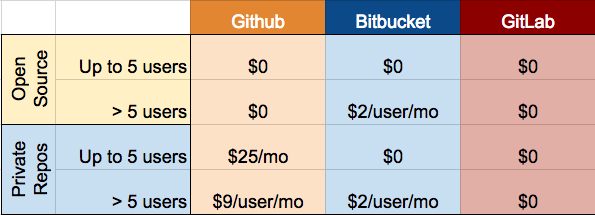
*Note: Github also includes a $7/month plan for individuals who want private repositories.
Each platform offers slightly different offerings at higher price points. For example, Github offers a 99.95% uptime SLA and 24/5 tech support starting at $21 per user per month, Bitbucket offers security features like IP whitelisting and required two-step verification starting at $5 per user per month, and Gitlab will give you more CI build minutes and a host of project management features for $19 per user per month. Bitbucket and Gitlab offer free trials if you think you might need some of these premium features.
Once your needs get more complex, I’d recommend checking out each provider’s hosting page to do your own comparison:
- Github Pricing
- Bitbucket Pricing
- Gitlab Pricing
Self-Hosted Pricing Comparison
All three of these services also offers a self-hosted option — typically for enterprise customers or users with special security requirements.

What is GitHub?
GitHub is also similar to GitLab which offers a repository hosting platform. GitHub is a developer-friendly tool that provides almost everything needed for the development and management of projects. Programmers can collaborate easily to fix the errors in code and for hosting open-source projects. GitHub is mainly designed for developers to contribute to the open-source projects in their repositories. GitHub is a highly collaborative tool used by millions of developers and programmers all over the world.
The majority of the open-source projects are hosted on GitHub. GitHub also offers paid features, but the free version also provides the same robust core features where CI/CD integrations can also be carried out without any problem.
The other reason for its popularity is it holds millions of public repositories and also it is adding more new features resulting in a more user-friendly and highly collaborative platform.
Check out how to create a GitHub Profile for free.
What is Bitbucket?
Bitbucket is one of today’s three famous GIT version control systems. Originally launched in 2008,in 2010 the service was acquired by Atlassian. Atlassian is quite famous among corporations for organizing tools like Trello, Jira, and Confluence. Not having as many features as GitLab or GitHub, Bitbucket attracts companies with seamless integrations due to its parent company.
Bitbucket became popular on the market because at some point it was the one offering unlimited, free private repositories. The service quickly attracted startups and small businesses that were determined to keep their code to themselves and were looking for new corporate solutions. Currently, other GIT systems also propose private repositories in free plans. But besides that, Bitbucket is free to official nonprofit organizations and charities, and it also offers discount options for students and teachers.
Bitbucket features
- Version control system tools from Bitbucket include all the standard features of any VCS. The main distinction is that this service introduces the project structure of repositories, as it keeps the main focus on integrated tools and their symbiosis.
- Project management is Bitbucket’s strong suit. Having native integrations with Jira, Confluence, Trello, Bamboo, and Opsgenie, this version control system flows all the inner processes, even CI/CD deployment, through the mentioned platforms.
- CI/CD automation is provided by Bitbucket in integration with Jira first of all, and it focuses on the integration, deployment, and automate dev to deployment.
- Security procedures include automated vulnerability monitoring, pull request scanning, and a security dashboard with corresponding data.
Best for: corporate-oriented teams.Who won’t benefit from it: small open-source projects.An additional benefit to the VCS: native integrations with Jira and Confluence.Companies using GitHub: PayPal, Klarna, Tesla Motors, Upwork.
![]() Bitbucket dashboard
Bitbucket dashboard
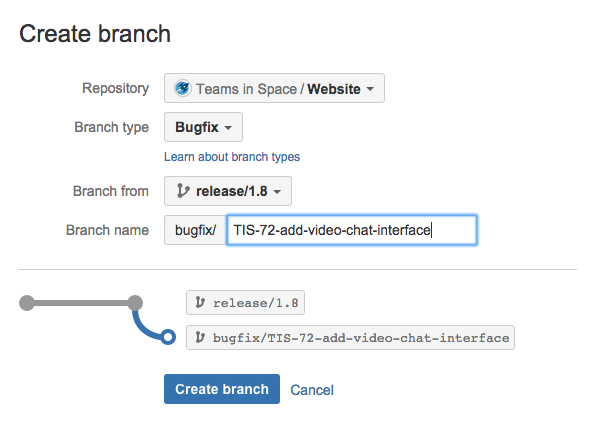
Bitbucket branches
![]()
Comparison table of GitGub, GitLab, and Bitbucket that highlights main differences between version control systems
Advantages and Disadvantages of GitHub
The advantages and disadvantages of GitHub are as follows:
Advantages of GitHub:
- GitHub is very useful to collaborate with other developers.
- You can easily showcase your work to recruiters.
- GitHub makes it easy to track the progress of projects.
- It gives you integration options that enhance the productivity of your projects. You can easily integrate GitHub with Amazon and Google Cloud.
- You can easily track the changes between the version of your applications.
- GitHub allows remote collaboration for developers from all over the world.
- You can find all the code and the documentation on GitHub in one place. However, there are several options to go on GitHub where each option provides you all the information on how to use it and its release code.
Disadvantages of GitHub:
- It doesn’t allow for the creation of private repositories.
- Some useful features of GitHub are paid and that’s the reason most people stopped using it.
- GitHub doesn’t offer a good API development.
- There are not many features in GitHub like other repository platforms in the market.
Import & Export
When thinking about moving to GitLab or GitHub, you should also consider the setup costs and resources needed for getting started. In that regard, the topic of available import and export features is pretty important.
GitLab offers detailed documentation on how to import your data from other vendors – such as GitHub, Bitbucket – to GitLab.
Import projects from 3rd parties, source:gitlab.com
GitHub, on the other hand, does not offer such detailed documentation for the most common git repositories. However, GitHub offers to use GitHub Importer if you have your source code in Subversion, Mercurial, Azure DevOps, and others.
Also when it comes to exporting data, GitLab seems to do a pretty solid job, offering you the ability to export your projects including the following data:
- Wiki and project repositories
- Project uploads
- The configuration including webhooks and services
- Issues with comments, merge requests with diffs and comments, labels, milestones, snippets, and other project entities
GitHub, on the other hand, seems to be more restrictive when it comes to the export features of existing GitHub repositories.
Popularity and Growth
Even though the tool’s popularity doesn’t matter that much in the development process itself, it’s best to motivate your developers to learn trending instruments. It’s going to be easier to recruit candidates who have experience working with the service, introduce new practices, and drive transformation in the organization.
So, let’s take a look at current popularity, growth dynamics, future trends, and user profiles. The number of users is important, but it’s also great to know who these users are. For instance, GitHub is known as a go-to destination for Ruby and Ruby on Rails developers because it hosts most gems and add-ons.
GitHub Statistics
GitHub is the biggest code repository, used both by organizations for private access and open-source collaboration. The platform is so popular that people often think it’s synonymous with Git itself – hence, the Git versus GitHub doubts emerge. According to Statista, GitHub hosts leading open-source tools, including Flutter, Microsoft’s VS Code and Azure Docs, Facebook’s React Native, Tensor Flow, Kubernetes, and others.
Currently, GitHub is used by , according to the data released in January 2020. It’s used by Microsoft, Facebook, Google, and other large corporations. In terms of popularity, this distributed version control service is the leader.
According to Google Trends, the popularity of GitHub has been fairly consistent over the last two years. The community will likely keep growing.
BitBucket Statistics
Jira’s popularity is constantly growing, and this trend is driving new users to BitBucket as well. BitBucket is used by Slack, Accenture, Figma, Paypal, and other companies. The open-source community on BitBucket is much less developed. Typical clients of the platform are active users of the Atlassian ecosystem – not open-source contributors.
Unfortunately, BitBucket doesn’t publish regular statistics on the number of users. According to their official news, in 2019, the product was used by 10 million developers. According to search trends, the service’s popularity nowadays is lower than GitHub’s or GitLab’s.
GitLab Statistics
According to GitLab’s case studies page, the tool is used by Drupal, Ticketmaster, BI Worldwide, and other enterprises.
Here’s the list of open-source initiatives hosted on GitLab. Rather than big business projects, it accommodates scientific initiatives and NGOs.
Unfortunately, GitLab doesn’t have official statistics on user count. According to some sources, the service is used by 200,000 – 500,000 organizations and developers. As for Google search trends, the service gets more mentions than BitBucket but much less than GitHub.
The final touch in GitHub vs GitLab discussion
In a highly competitive environment of developing software, repository management services have become vital to the success of software projects. GitLab and GitHub make it easy to manage changes within the software development lifecycle while fostering a collaborative environment that allows developers to share information and knowledge. Ultimately, both GitHub and GitLab have their sight set on DevOps.
To sum up, the GitHub public repository is a collaborative platform that hosts and reviews code, manages projects, and helps build software — all through a distributed version control and source code management functionality. On the other hand, GitLab is a web-based repository that offers collaborative features that are heavily focused on the DevOps toolchain and offers seamless Continuous Integration/Delivery.
GitFlic. Российский GitHub. Рассмотрение сервиса и его нюансы +8
- 25.07.21 14:46
•
mepihin
•
#569484
•
Хабрахабр
•
•
12000
Git, Облачные сервисы, Управление разработкой
Рекомендация: подборка платных и бесплатных курсов продакт-менеджеров — https://katalog-kursov.ru/
Начнем с простого, что мне пришло письмо на почту такого вот содержания:
Смотрим сразу, что пригласили на тесты, но также обговорили момент о платном контенте. Ну ладно, всем надо как-то зарабатывать. Теперь перейдем на их сайт и посмотрим…
По сути, основное, что надо для работы в команде отсутствует. Прикольно, что они сразу подключат интеграцию с телегой. В нашей компании пользуются локальным GitLab, а бота для телеги мы написали сами, что заняло очень мало времени. Так что, как крутую фичу считать не будем. Да, многие скажут, что это же тест версия, поэтому тут нет много функционала… Да, соглашусь, но работа с ветками и так очевидна и проста, для этого не требуется супер технологий и знаний, а вот работа с трекерами и обсуждением кода — принципиальна.
Пойдем читать пользовательское соглашение. Сразу встречаем пункт о платных фичах:
Но, на сайте ни слова не указано о том, что это за фичи… Очень интересный подход… Скорее всего, просто посмотрят чем чаще пользуются и сделают платным ![]() Типичная тема в рашке.
Типичная тема в рашке.
Интересный момент по возрастным ограничениям. Вообще не понятен. То есть, хостить код можно только 18+??? Серьезно? А в чем смысл ограничений таких? Уменьшить аудиторию? Или еще чего?
Не хватает только кнопки «Войти через ГОСУСЛУГИ» :-D. Или круче: «Хостинг кода только для вакцинированных».
Ну по просмотру соглашения все. Особо много тут не написано, что тоже странно, но хоть как-то более менее ясно о чем речь. Теперь, давайте создадим аккаунт и попробуем что-нибудь.
Создание аккаунта
Форма регистрации уж сильно похоже на GitHub до их переделки. Кстати, верстка вся на Bootstrap: Bootstrap v4.6.0, когда уже во всю вышел нормальная 5 версия без jQuery…
Блин, орнул с иконки медведя… Просто, российский хостинг кода… Россия… Медведи… Но заметьте, что Username на английском в форме. А смысл, если все остальное не русском? Надо исключать это пиндоскую зарубежную тему.
Ммм, ошибки на экран…
Обсуждаем интерфейс
Вот тут внимание… Я не то, что проорался, я чуть со стула не упал
Знаете же в GitHub можно отметить проект звездой и следить за ним… Ну так вот, без комментариев:
Зазвездить…. Вы серьезно? Что вы там курите, что у вас такие вот выражения…
Интерфейс достаточно простой и понятный, но он на столько убогий, что сервисом просто не хочется пользоваться (субъективное мнение).
Ради интереса, зайдем на любой из проектов…
Ну все просто, хотя просматривается тема плохих российских интерфейсов… Но тут я кое что заметил…
Заметили? Наверху тЭги, а справа тЕг.
Если немного копаться в коде, то можно увидеть такие вот комментарии, которые наталкивают на мысль, что сервис пишет команда школьников… А также часть кода явно скачана…
Ладно, думаю надо завершать на этом… А то сил моих смотреть это больше нет…
Заключение
Хоть это и тесты, но они уже публичные. Ребята в компании особо не парятся на проверке за своими программистами ошибок логических по тексу. Интерфейсные решения соответствуют очень давнему 2008 году. Версионность фреймворков оставляет желать лучшего. Проект очень сырой, хотя, я думаю, что в дальнейшем он не будет пользоваться большим спросом из-за того, что они не предоставляют уникальных фич по сравнению с конкурентами.
What is Git?
Git is a Version Control system. The idea behind version control is that every time a change is made, a snapshot is taken of the entire codebase (sometimes including things that aren’t code). This allows, at the very core, the option to go back to earlier versions of the code in case something broke.
Going back in time is far from the only feature of version control, though. Having control of what gets put into the code is critical. It becomes even more vital for public open-source projects, which could not exist without Git.
Git has been the leading version control system for quite some time now, overtaking SVN around 2018. Part of the reason is the preference of developers for Git as a versioning system with the main driver being local commits.
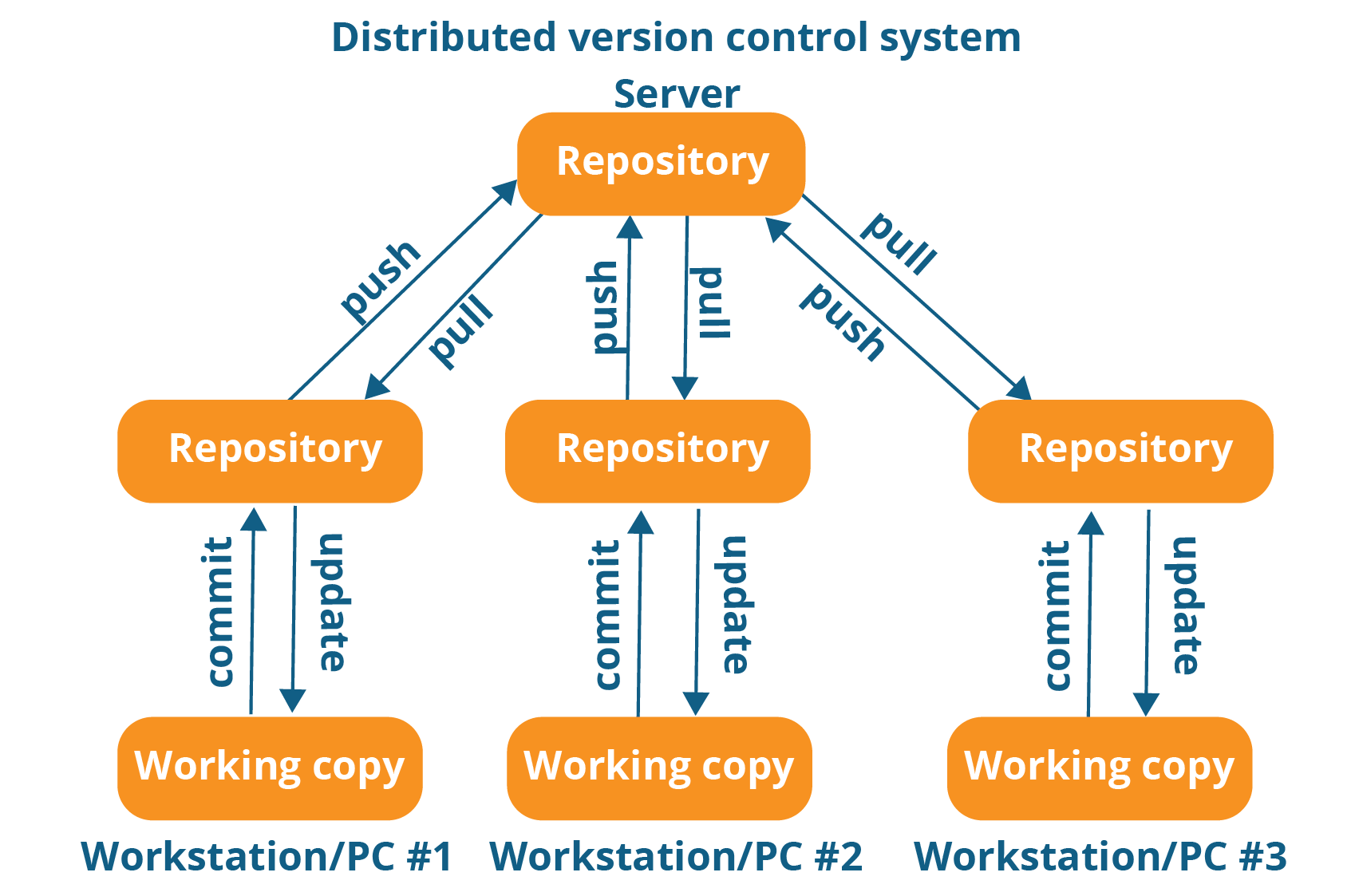
Source: https://www.edureka.co/blog/what-is-git/
Unlike SVN, which only allows committing code to the main repository, Git allows developers to commit code to their local checked-out code. This is a significant improvement over SVN’s system which allows developing large code features locally to completion before merging it to the main repository. In SVN the agreed-upon method for achieving something similar would be to create a branch in the main repository, which can quickly cause branch bloat and become a nightmare to manage.

However, the main drive for Git Adoption is the free and accessible nature of hosting code repositories on platforms like GitHub and GitLab. Open-source code as it exists today would likely not be feasible without a free platform to host it on. Having to pay hard-earned cash to host open-source code would be a major barrier for the open-source community. Most people are happy to invest their time and knowledge into a project they are passionate about, but ask them to spend money and a large number of them would walk away.

































